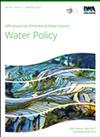Need to adopt scaled decentralized systems in the water infrastructure to achieve sustainability and build resilience
IF 1.8
4区 环境科学与生态学
Q4 WATER RESOURCES
引用次数: 1
Abstract
Urban water infrastructure (UWI) in cities faces enormous pressure to cope with increased water demands, handle extreme events and improve the service with minimum resource consumption and environmental impacts. The current study presents an approach for addressing the challenges in UWI, specifically in water supply and sewerage. The article argues a need for a paradigm shift that simultaneously includes the sustainability and resilience aspects throughout the life cycle of UWI. The article further highlights the issues in the prevailing approach of centralized infrastructure and demonstrates the necessity of moving away from such an approach and shifting towards decentralized infrastructure. Understanding the factors accelerating decentralization to attain a paradigm shift to decentralization is necessary. Hence, the study first identifies the drivers of decentralization. Secondly, the need for an appropriate scale to be considered while implementing decentralized UWI is highlighted in this study. Furthermore, the effect of the scale of infrastructure is discussed through the trade-offs between life-cycle costs, ease of governance, resilience and recycling benefits. The approach of scaled decentralization outlined in the study will be useful for developing countries to plan new infrastructure and also for developed countries to replace the ageing UWI to create future sustainable and resilient urban systems需要在水利基础设施中采用规模分散的系统,以实现可持续性并建立复原力
城市供水基础设施(UWI)面临着巨大的压力,需要以最小的资源消耗和环境影响来应对不断增长的用水需求、应对极端事件和改善服务。目前的研究提出了一种解决UWI挑战的方法,特别是在供水和污水处理方面。本文认为需要进行范式转变,同时包括UWI整个生命周期的可持续性和弹性方面。本文进一步强调了集中式基础设施的主流方法中的问题,并证明了从这种方法转向分散基础设施的必要性。了解加速去中心化的因素以实现向去中心化的范式转变是必要的。因此,该研究首先确定了权力下放的驱动因素。其次,本研究强调了在实施分散式UWI时需要考虑适当的规模。此外,通过在生命周期成本、治理便利性、弹性和回收效益之间的权衡,讨论了基础设施规模的影响。研究中概述的大规模分散化方法将有助于发展中国家规划新的基础设施,也有助于发达国家取代老化的UWI,以创建未来可持续和有弹性的城市系统
本文章由计算机程序翻译,如有差异,请以英文原文为准。
求助全文
约1分钟内获得全文
求助全文
来源期刊

Water Policy
环境科学-水资源
CiteScore
3.10
自引率
12.50%
发文量
81
审稿时长
6-12 weeks
期刊介绍:
Water Policy will publish reviews, research papers and progress reports in, among others, the following areas: financial, diplomatic, organizational, legal, administrative and research; organized by country, region or river basin. Water Policy also publishes reviews of books and grey literature.
 求助内容:
求助内容: 应助结果提醒方式:
应助结果提醒方式:


